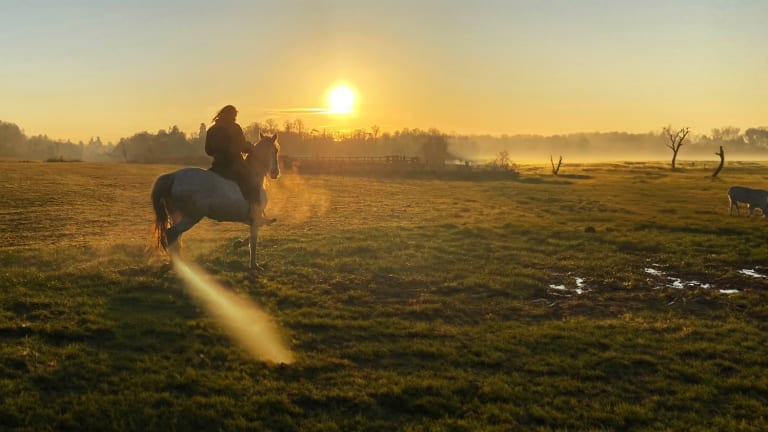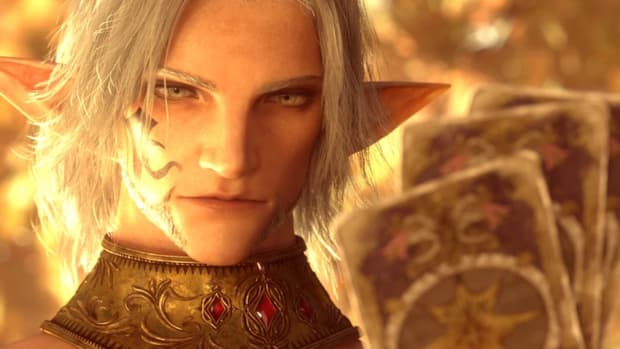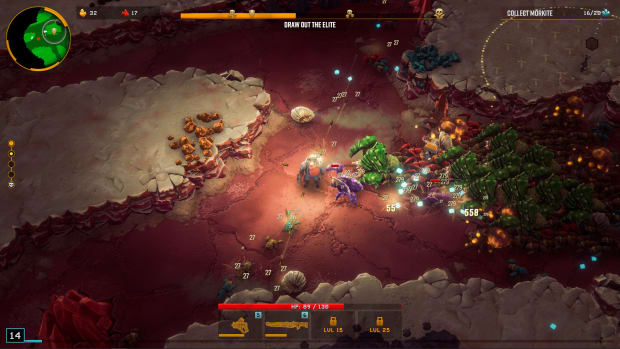
Eels, deals, and medieval meals with Rebellion CEO Jason Kingsley

There aren’t many people in this world who could get away with telling you they live as a medieval knight without being ridiculed. But when Jason Kingsley OBE says it – with his unkempt hair and slightly disheveled look, as if he’s just wrapped up a fistfight with a particularly angry bush (and won) – your inner monologue just goes: “Fair enough”.
The CEO of Sniper Elite developer Rebellion is literally, right now in this very moment, in the process of building his own castle.
“It's got stables for horses, an armory where I store my weapons or my armor, and I do quite a lot of study in what I call the chapel,” Kingsley tells me, in a tone that suggests what he just said was a completely ordinary sentence.
“I'm not religious, but I do have a chapel because it's kind of a nice idea. So yeah, I've always wanted to live in a castle. There are not many of them available.”
Yep. Fair enough.
For a while, he subsisted solely on medieval food.
“It was actually very good,” he insists. “It's surprisingly filling. I still eat quite a lot of oatmeal. I usually have porridge for breakfast, which I really like. And I have cinnamon in it. Now, cinnamon was available in the medieval period. And I worked out how much it was – roughly the same price as expensive caviar is today. Salt, obviously, was readily available.
“The food is very seasonal, and I think that's something we've missed. You know, you could get strawberries in season, but strawberry season is probably only two or three weeks. So you have strawberries, but then you'd miss strawberries for a whole year.”
Aye, fair enough. Strawberries and that.
He once used a Zweihänder on one of those prop heads filled with mush and goo and felt rather bad about it after.
“I bought a ballistic head,” he says. “I wanted to feel what it was like to chip it through with a sword, and it's really horrible. A really unpleasant feeling. The only way I can describe it is like, you know, Easter eggs... Imagine filling an Easter egg with jelly and then hitting it with a hammer. It's got that sort of biscuit break. It doesn't snap. It's got that crumbling, biscuity feeling.
“It's an extremely unpleasant experience. And I shocked myself because I was slightly off to one side and I chopped the whole face and skull off. Horrible.”
Absolutely fair enough. I can see all of that. Mushing heads. Checks out.
I’m speaking with Kingsley on the launch of his book, Leading the Rebellion: Questing To Succeed In Work and Life, which charts how living by his own chivalric code has helped him to become a better businessman.
Calling Kingsley a history buff is a bit like saying Gordon Ramsey is a foodie. When we jump on the call, we spend at least 20 minutes talking about how the English used to trade predominantly with eels. I’m transcribing it right now. We’re slipping and sliding way down the eel hole.
“Rent wasn't necessarily paid in money,” he says. “There was one [rent story] about a pair of red trousers every year. It's like, ‘what?’ Yeah, a whole load of firewood, a pair of red trousers, and a little bit of money [for your rent]. Or eels. 10,000 eels.”
Head to Kingsley’s YouTube channel, Modern History TV, and you’ll find a bunch of videos where he both talks about eels and attempts to demystify and humanize the people of the medieval era. One of his most popular videos, for example, details how difficult it was to take a dump when you’re rocking full plate armor, which Kingsley often is (wearing armor, not dumping).
“I think a lot of modern people see the past through the lens of movies and TV and think it's special or different,” he tells me. “They were just us. Different circumstances, different education, and different language expectations, but those blokes encased in steel on the battlefield would have had the same kind of thoughts that we would in the same situation.
“[In one video I had] a fly inside my helmet pinging around. Very distracting. I've had a few people write comments and go, ‘Oh yeah, I was on my motorbike and a wasp flew into the helmet and I was on the motorway,’ and it's like, ‘Yeah, that's exactly it. That's literally the experience when you're on a horse.’”
These similarities are why Kingsley believes channeling the past is useful for running a company like Rebellion, one of the longest-surviving independent game studios in Britain, which also publishes games, books, 2000AD comics, and has its own film studio.
He speaks about his own chivalric code as if it’s his personal bible.
“[It’s useful for] having guidelines for how you make decisions,” he says. ”It helps you focus. What's an ethical way to deal with this problem? What's the right thing to do? For example, if you've got the money, try to pay people quickly, because it's not going to make that much difference if it's in your account for another few weeks. But they've done a job. They deserve to be paid.
“There’s a thing called ‘velocity of money’, in economics. It's a theory I didn't know about, but the idea is that you pay them, and they can then pay somebody else. And then, the more the money circulates, the more effective it is for society, which is an argument for why billionaires, for example, with huge investments, actually take money out of an economy because the money is not flowing. If I pay a builder to build my castle, they're paying all their bills as well. And the money circulates quite rapidly. Whereas if you sit on the money, it's arguably coming out of the economy, and not really circulating and not doing any good for lots of people.”
Whenever Kingsley has an objective – whether that’s ‘build a castle’ or ‘smash a ballistic head in with a seven-foot sword’ – he sees it as a quest. In a way, his idea of living by a chivalric code is similar to how apps like Zombies, Run and Pokémon Sleep gamify day-to-day life.
“A quest can be internal as well,” he says. “Quest can be trying to get fitter and healthier. They're probably not the things necessarily that the troubadours are going to sing songs about. Read that book that you've been meaning to read for a while. That short story you've been meaning to write – it's quite fun if you actually set it up as a quest for yourself. My quest is I want to write a chapter of a book. Good. That's my objective. That's my holy grail this month. How do I do that? I think sometimes framing life's challenges as a knightly quest, as silly as that sounds, can actually help you grab that sense of adventure.”
Working in video games and having a broad knowledge of medieval warfare does come with its drawbacks, of course. Kingsley struggles to play games with sword combat because he knows you can’t just slice through plate armor like that. You have to go for the gaps, he tells me – the neck, the eyes, the armpit. And no one in real life actually slings their sword over their back, even if, he admits, “it does look cool”. The same goes for dousing your sword in oil and setting it aflame, which would only serve to highlight you for the archers.
“There's a lot to be learned from strategy games,” he says. “The right kind of tactic in the right circumstance can be devastating, but the same tactic in other circumstances can be the opposite. It can be a total failure.”
Rebellion has played it pretty safe in recent years, sticking to the same tactics. Its Sniper Elite games and their spin-offs have been a major focus, and even its latest new IP, Strange Brigade, shared a fair bit of DNA with those games. But it’s a strategy that’s clearly working for the studio, which has kept its independence during a time when others are clinging onto giant publishers like life rafts.
“We try and keep a balance between sequels and new IP,” Kingsley says. “Strange Brigade was a new IP that was really successful for us, and there’s [a new IP] that’s not been announced yet so that's exciting. There's more Sniper Elite coming along, which is great. I want to do more Zombie Army stuff as well. The audience loves them.”
The last time I spoke to Kinglsey was around five years ago and he teased that he was working on his dream project. He tells me that it’s still in development. The idea has changed over the years, but it’s shaping up and he hopes it will be out in “the next couple of years”. Rebellion is also allowing indie label Good Shepherd to manage its licensing efforts for games based around 2000AD, so we may soon see the results of that partnership bear fruit (when it’s in season, of course). And if you’re hoping to see Karl Urban return as Dredd on the big screen at some point, Rebellion hasn’t given up hope yet.
“I have been working for years on trying to find the right business partner for that,” Kingsley says. “We've had conversations with all the big players. Conversations are still ongoing. But the terms that we're being asked for, we can't support. They're not how we want to work. So we're getting there. We're making progress. But it's slow, slow, slow. So yes, I want to get some more of it done. Obviously, I want to do cool stuff. There's nothing to announce yet.
“One of the things I think sometimes the general public doesn't understand is how much work goes on behind the scenes, how many false starts, and how many hours you spend negotiating with somebody only to reach a point where you actually can't conclude a deal. You can't agree because it just wouldn't work for the legacy that is the archive of material we've got. We're not going to sell Judge Dredd to people basically, and people want to buy it. That's what it comes down to. I'm afraid that won't work for us. No, we're the guardians of this IP.”
If the people at the negotiating table don’t want to listen, I happen to have a video featuring a ballistic head that might convince them.







